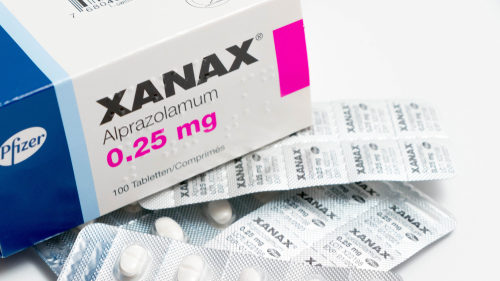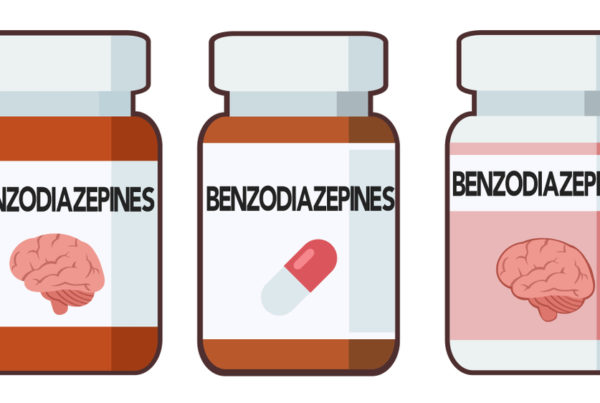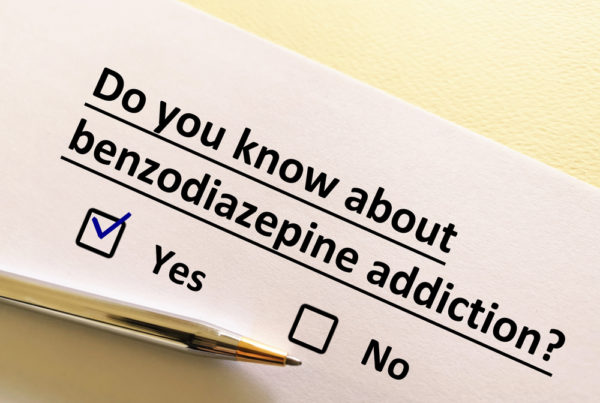Are you or a loved one grappling with anxiety, insomnia, or panic disorders and have turned to medications like Xanax, Valium, or Ativan for a sense of relief? While benzodiazepines, dubbed “benzos,” might offer temporary respite, it’s important to know the potential risks associated with these medications.
Let’s explore benzodiazepine addiction and how these seemingly helpful pills can negatively impact your life.
What Exactly Is Benzodiazepine?
Benzodiazepines (“benzos”), such as Xanax, Valium, and Ativan, are a type of a mild tranquilizer psychoactive drug that’s prescribed for issues such as panic and anxiety disorders, insomnia, and seizures. The trouble with these types of drugs is that they are mentally and physically addictive, leading some people to either form a benzodiazepine dependence or overtake these medications. And oftentimes, people misuse benzodiazepines in combination with other substances, such as alcohol, which can be very harmful, and even fatal.
Benzodiazepines are part of the pharmaceutical world, which means they’re a legal prescription drug. Unlike a lot of illicit drugs, benzos are branded with a name given to them from a pharmaceutical company, making them tougher to identify as problematic. If you’re concerned someone you know may be abusing benzos, here is a list of common brand names:
-
Xanax
-
Valium
-
Restoril
-
Ativan
-
Niravam
-
Librium
-
Halcion
-
Klonopin
-
Alprazolam
-
Tranxene
Could I Be Addicted to Benzodiazepine?
Oftentimes users may not know they have an addiction to benzodiazepines until it’s too late to get help. However, the earlier you tackle the problem, the better chance you have of overcoming your addiction.
Recognizing the signs of benzodiazepine addiction is crucial for timely intervention. From blurred vision and mood swings to risky behaviors like driving while under the influence, there are several red flags to watch for. The signs and symptoms not only present physically, but psychologically and behaviorally as well. Common themes among individuals struggling with benzo addiction include the following:
-
Blurred vision
-
Mood swings
-
Drowsiness
-
Weakness
-
Poor judgment
-
Diminished neurological capacity
-
Risk-taking behavior, like driving under the influence, or using at work
-
Borrowing money, stealing, draining bank accounts
-
Becoming reclusive and secretive
-
Hanging out in new social circles
-
Taking benzodiazepines with alcohol or other drugs
-
Doctor shopping – Attempting to score by lying, or pandering to multiple doctors
-
Trying to score Benzodiazepines through friends, colleagues and acquaintances
-
Failed attempts at quitting
How Is a Benzo Addiction Diagnosed?
The DSM-5 states that to be diagnosed with a sedative use disorder, you must exhibit 2 out of 11 of the listed symptoms, within a 12 month period. The following is an example of 6 of the more common symptoms:
- Substance is often taken in larger amounts or over a longer period of time than was intended
- Persistent desire or unsuccessful efforts to cut down or control substance use
- Great deal of time is spent in activities necessary to obtain the substance, use the substance, or recover from its effects
- Important social, occupational, or recreational activities are given up or reduced because of substance use
- Tolerance, as defined by either of the following: a need for markedly increased amounts of the substance to achieve intoxication or desired effect. OR a markedly diminished effect with continued use of the same amount of substance
- Substance use is continued despite knowledge of having a persistent or recurrent physical or psychological problem that is likely to have been caused or exacerbated by the substance
What Are the Long Term Effects of Benzo Abuse?
Long-term effects of benzodiazepine abuse can include cognitive impairment, decreased sex drive, and increased depression & anxiety. They can also cause a lot of damage to important functions of the brain, such as visuospatial processing, cognition, memory, verbal learning ability and processing speeds. The capacity for learning simple tasks, and retaining verbal information can be drastically reduced. However, depending on the severity of prolonged use, the damages can be reversed through extended sobriety. Benzos have also been linked to Alzheimer’s in older users. Studies show that upwards of 84% of people who took the drug for 6 months or longer had a stronger chance of developing the disease.
Does Benzodiazepine Cause Withdrawal Symptoms?
When someone abuses Benzodiazepines, they will naturally build up a tolerance to the effects. This requires users to take increasingly higher doses. The problem is, once your body acclimates to having high amounts of the substance in your bloodstream, it becomes reliant on it to function. When dosages are reduced or taken away completely, benzodiazepine withdrawal symptoms begin to manifest.
These withdrawal symptoms are extremely uncomfortable and can even be deadly if not properly managed. That’s why benzodiazepine withdrawal treatment should be led by medical professionals, and clients should be under the direct care of a physician. When benzo abuse is stopped or decreased, the body may go through a withdrawal. Benzodiazepine withdrawal symptoms include:
-
Insomnia
-
Anxiety
-
Panic
-
Sweating
-
Headaches
-
Muscular Pain
-
Nausea
-
Trouble concentrating
-
Irritability
-
Tremors
-
Heart palpitations
If you are taking particularly high doses of benzodiazepines, withdrawal symptoms can even lead to psychosis and seizures.
Benzodiazepine Detox
The first step of benzodiazepine addiction treatment is ridding your body of the substance safely and effectively. A physician-led benzodiazepine detox protocol is the safest way to wean the body’s dependence from the drug. After detoxing, a treatment program may be necessary to support you in the deep emotional work required to maintain long-term sobriety.
Achieving Long-Term Sobriety
Haven House Sober Living stands as a beacon of hope for individuals seeking structured recovery from substance abuse in Los Angeles. With a focus on providing safe environments and support for long-term sobriety, our facilities offer a nurturing space to transition back into independent living.
If you or a loved one are navigating the challenging path of recovery, consider exploring the Haven House Sober Living program for a supportive and encouraging atmosphere as you work toward maintaining lasting sobriety.
Sources:
Benzodiazepine Addiction: Symptoms & Signs of Dependence | American Addiction Centers
Benzodiazepines (Benzos) | Cleveland Clinic
A Secret Weapon for Stopping Benzodiazepines Safely | Psychology Today



